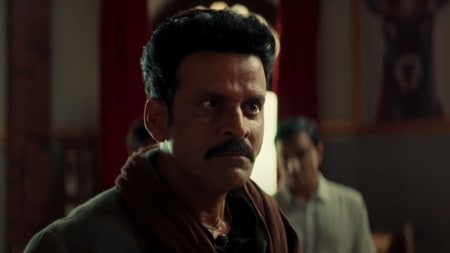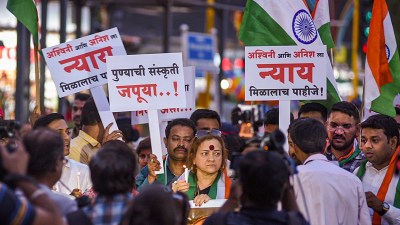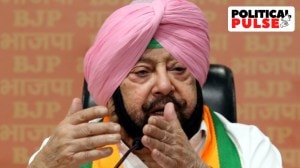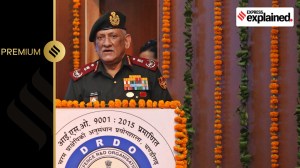- India
- International
When Arun Shourie joked about being the only editor to be sacked twice from an organisation
Arun Shourie’s new book offers vignettes of the idiosyncrasies that defined the political class and newsrooms of his time and his journey as an editor through it all
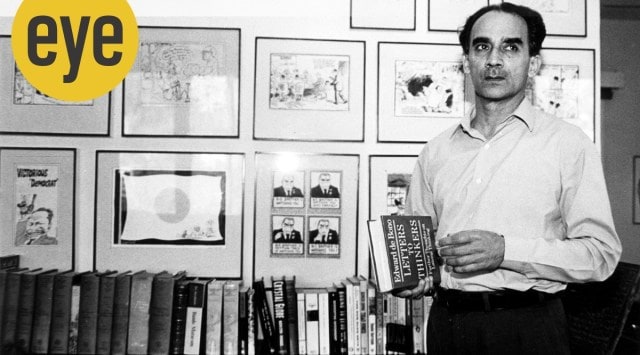 Arun Shourie at Indian Express Office in October 1995. (Express archive photo by Sunil Saxena 28.10.1995)
Arun Shourie at Indian Express Office in October 1995. (Express archive photo by Sunil Saxena 28.10.1995)Arun Shourie rocked the rather staid Indian newspaper world back in the Seventies and Eighties. Though trained as an economist, he left an indelible mark on Indian journalism with his insightful, well-researched crusading campaigns which, at times, changed the course of politics; brought about new legislation and focused public attention on governmental corruption. Some of the investigative series he either wrote or oversaw — the prolonged detention of thousands of undertrials, the blinding of prisoners in Bihar to serve as a deterrent, the Kamala case which exposed trafficking of women, the scandal of the missing Kuo Oil deal file, the Antulay trusts and Bofors — are landmarks in journalism history and public interest litigation. The Indian Express stories regularly sparked off a furore in Parliament, compelling the government to respond.
Shourie opened the windows of The Indian Express to permit the winds of change to blow through. As a reporter at the Express at that time, I was one of those fortunate ones to benefit from the changes he brought about. He joined The Indian Express shortly after the Emergency; the highly stratified hierarchy of the newsroom was a very different place from when he left. We watched in awe and delight as he trashed the concept that the editorial pronouncements by a few elite editors cooped up in their own tiny echo chambers was the soul of the newspaper. The newspaper’s strength lay in its reporters, he proclaimed. We were encouraged not to simply report news like stenographers, but what we wrote should be news. A byline and placement on the front page began to be determined by newsworthiness of the story and not on the basis of the seniority of those writing the piece, as was often the case. There were no taboos in Shourie’s selection of topics or his writing style. Even the normally sacrosanct courts were not exempt from his scrutiny and he would pore over and dissect judgments, astounding everyone with his intellectual arguments.
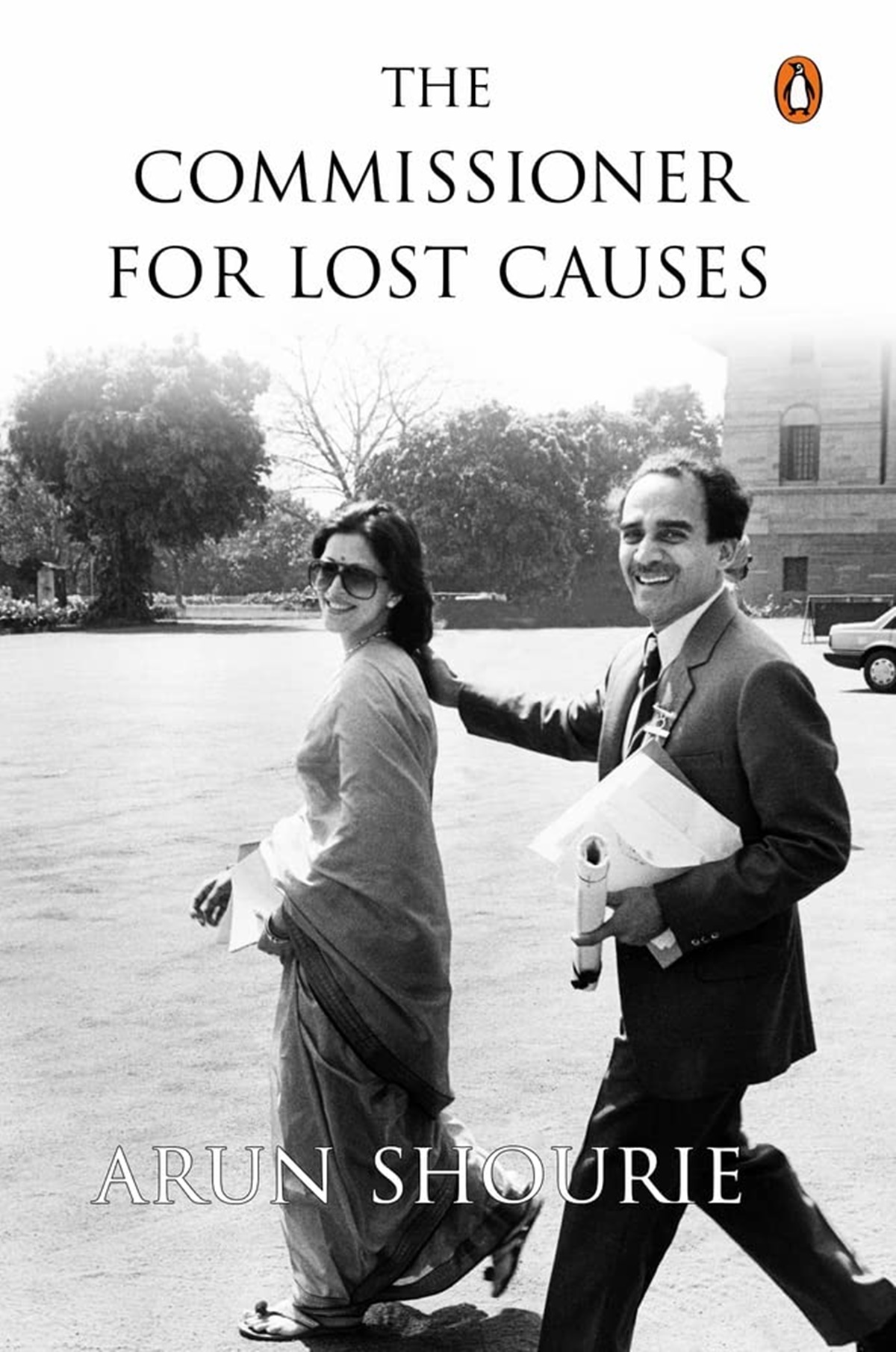 The Commissioner for Lost Causes
The Commissioner for Lost CausesArun Shourie
Penguin Viking
616 pages
Rs 999 (Amazon.in)
Another of his trademarks was deluging a reader with details, analysing documents — whether files or rule books or judgments. Some of his envious colleagues dubbed his writings more in the style of a pamphleteer or a lawyer’s brief than a newspaper article, but his aim was to make a watertight case.
Shourie was spotted by Ramnath Goenka, the legendary founder of The Indian Express. He recognised his talent, drive and dedication, even as he sometimes wondered whether the racehorse he had hired would wreck his paper.
One of the book’s high points is Shourie’s vivid anecdotes of the newspaper baron who had the guts and guile to take on governments, when he disagreed with their policies. Goenka’s colourful language, replete with expletives and imagery, has been reproduced by the author, who obviously kept detailed notes to illustrate just how canny, courageous and ruthless Goenka was.

Since the time of Mahatma Gandhi, Pandit Jawaharlal Nehru and Sardar Vallabhbhai Patel, there was not a leader whom Goenka could not talk to and address by their first name. Both he, and later Shourie, regularly appealed to the courts as the forum for last appeal. When Indira Gandhi decided to take over his newspaper during the Emergency, he fought back fiercely. According to the author, at one point, Goenka even summoned a well-known lawyer to convey a message to the prime minister that if she arrested his son and daughter- in-law, he would release the letters from Kamla Nehru to JP’s (Jayaprakash Narayan) wife Prabhavati, exposing Panditiji’s neglect of his wife and her ill-treatment by his sisters.
Sometimes, his powerful friends would protest against an item in the newspaper and the proprietor could simply feign ignorance and chastise his editor roundly in front of the complainant. Immediately afterwards, he would tell the editor privately not to pay any heed to those objecting.
The relationship between Shourie and his proprietor was both close and stormy. Shourie jokes he was the only editor with the distinction of being sacked twice from the same newspaper.
The book makes for a fascinating read since, with his puckish sense of humour and sharp insight, the author brings out vividly the many idiosyncrasies and behind-the-scenes happenings in governments of the day. Devi Lal, as deputy PM, used the choicest abuses and threats against the newspaper for writing about his son (Om Prakash) Chautala’s brazen ballot stuffing in the 1990 Meham by-election.
According to Shourie, VP Singh as PM pulled the Mandal Commission (in 1990) out of cold storage simply to counter the threat from Devi Lal. Then cabinet secretary Vinod Pandey had relied on his blind faith in astrology to run the country. Shourie discloses that once he rushed from Goenka’s residence to the Rashtrapati Bhavan to urge president Zail Singh not to sign a letter calling for the dismissal of Rajiv Gandhi as prime minister. Though he believes, in retrospect, that Singh enacted the farce of pretending to send the letter, to serve as a warning to Rajiv Gandhi, the ruse worked.
Shourie once advised me as a reporter that when writing a piece one should not include all sides of an argument since it detracts from the central point you want to make. With apologies to my mentor, I must, however, add a caveat or two to my praise and admiration for the book. There is a thin line between self-righteousness and being self-centred. The uncharitable digs at his fellow editors — from S Nihal Singh and Kuldip Nayar to George Verghese and S Mulgaokar — all journalists of great repute, are uncalled for, and, perhaps, in poor taste. Perceptions vary when seen from different angles and Shourie sometimes suffers from tunnel vision.
One does also wonder when the author expounds at great length on his past investigations, whether 35 years down the line, a younger generation is really interested in knowing every last detail of corruption scandals of yesteryears, when the political situation has since undergone a sea change.
Coomi Kapoor is contributing editor, The Indian Express
May 25: Latest News
- 01
- 02
- 03
- 04
- 05










